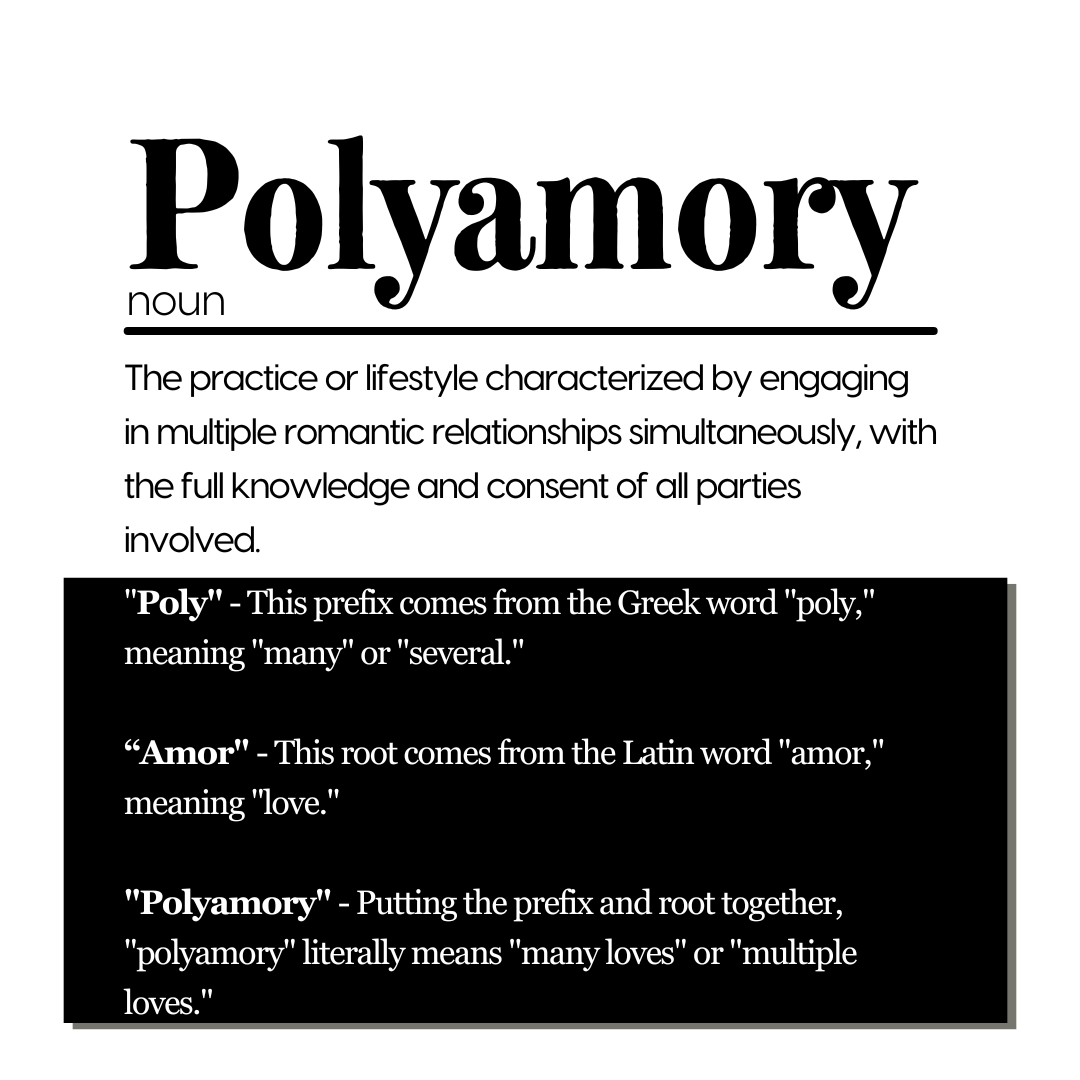What is a Polyamorous Relationship?
A polyamorous relationship is a type of romantic relationship where individuals are open to having more than one intimate relationship at a time, with the full knowledge and consent of all parties involved. This approach emphasizes open communication, honesty, and ethical non-monogamy.
Introduction to Polyamorous relationships
Polyamory, derived from the Greek "poly" (many) and Latin "amor" (love), literally means the capacity to love many. Unlike monogamy, which is based on exclusive love and partnership, polyamory opens the door to multiple romantic relationships with everyone's consent and knowledge.
Research indicates a rising interest in non-monogamous relationships, with studies suggesting that about 4-5% of the U.S. population engages in some form of ethical non-monogamy. This growing trend underscores a shift towards exploring more inclusive and flexible relationship structures.
The Core Principles of Polyamorous Relationships
The foundation of polyamorous relationships rests on three pillars: consent, communication, and honesty. These principles are essential for creating and maintaining healthy, ethical relationships.
Consent is the bedrock of polyamory, requiring clear and enthusiastic agreement from all parties involved in opening or expanding their relationship dynamics.
Communication is vital for expressing desires, setting boundaries, and discussing expectations. Open and honest dialogue fosters trust and helps navigate the complexities of multiple relationships.
Honesty involves being truthful about one's feelings, desires, and concerns. It is crucial for building and maintaining trust among all partners.
The Different Types of Polyamorous Relationships
Polyamorous relationships manifest in various structures, each with unique dynamics. Hierarchical polyamory recognizes primary and secondary relationships, often differentiating by the level of commitment or entanglement.
Conversely, non-hierarchical polyamory dismisses such rankings, treating all relationships with equal importance. Polyfidelity refers to closed networks where relationships exist exclusively within a defined group. Each structure offers distinctive experiences, underscoring the versatility of polyamory.
Hierarchical Polyamory
In hierarchical polyamory, the designation of 'primary' often involves partners who share life entanglements like marriage, co-parenting, or joint finances, which can naturally lead to prioritizing their needs and decisions. 'Secondary' relationships, while still meaningful, might not have the same level of entanglement or decision-making influence, which requires clear communication and understanding among everyone involved to navigate potential emotional complexities.
“Hierarchical polyamory invites us to examine our beliefs about love, commitment, and intimacy, challenging us to redefine these concepts on our own terms.”
Embracing Equality in Non-Hierarchical Polyamory
In non-hierarchical polyamory, relationships are approached with the philosophy that no one partnership holds precedence over others, regardless of their duration or nature. This model fosters an environment where each connection can grow organically, based on its own merits and the desires of the individuals involved, rather than predetermined hierarchies or roles.
It emphasizes the importance of equity and autonomy, allowing partners to navigate their relationships without the constraints of ranking, which can lead to more authentic and satisfying engagements for all involved.
The Concept of Polyfidelity
Within the framework of polyfidelity, all members agree to a collective boundary that restricts romantic and sexual interactions to within the group, creating a closed loop of intimacy and trust. This model often requires a strong foundation of communication and mutual agreement on the parameters of the relationship, ensuring that every member feels secure and valued.
Polyfidelity can foster a sense of exclusivity and deep connection among members, as it emphasizes commitment and loyalty to the group dynamic, mirroring some aspects of monogamy while still embracing the principles of polyamory.
Challenges in Polyamorous Relationships
Polyamory, while rewarding, is not devoid of challenges. Jealousy, time management, and societal perceptions pose significant hurdles. Developing strategies to manage jealousy and insecurity is crucial, as is devising effective time management plans to nurture each relationship. Polyamorous individuals often confront societal misconceptions and prejudice, necessitating a resilient and supportive community.
Managing Jealousy and Insecurity
Techniques for addressing emotional challenges emphasize self-awareness and fostering secure attachments. By encouraging partners to explore the root causes of their feelings, individuals can better understand their emotional triggers and work through them constructively.
Creating a culture of reassurance within relationships can help mitigate feelings of insecurity, ensuring that each partner feels emotionally supported and valued. Practicing compersion, or finding joy in a partner's happiness with others, is another advanced strategy that can transform jealousy into a positive force within polyamorous dynamics.
Time Management Strategies
Practical advice for scheduling and prioritizing relationships ensures that each partner feels valued and respected. It's essential to use tools like shared calendars or regular check-ins to effectively manage time, allowing for clear communication and the anticipation of each partner's needs and expectations.
Recognizing and respecting the quality of time spent together over quantity can help deepen connections without the pressure of constant interaction. Flexibility and understanding that different relationships may require different amounts of time and energy are crucial in maintaining a balanced and fulfilling polyamorous network.
Legal and Social Considerations of Polyamory
The legal landscape for polyamorous families remains complex, with many facing uncertainty regarding marriage, custody, and property rights. However, societal perceptions are gradually evolving, with increased visibility and acceptance of non-monogamous relationships.
-
An overview of current legal challenges and rights for polyamorous families reveals a complex tapestry of jurisdictional variances and evolving legal frameworks. Many polyamorous families navigate issues related to marriage laws, child custody, and estate planning without the clear protections afforded to monogamous couples. Advocacy efforts are underway to expand legal recognition and rights, aiming to address these disparities and promote equality. As legal precedents begin to emerge, they pave the way for more inclusive policies that acknowledge and protect the diverse structures of modern families.
-
Examining the shift towards greater societal acceptance and understanding of polyamory highlights the role of media representation, education, and visibility in transforming public opinion. Increased portrayal of polyamorous relationships in television, literature, and online platforms has contributed to a broader awareness and normalization of these relationship models. Grassroots movements and community advocacy play a critical role in challenging stereotypes and promoting a nuanced understanding of polyamory. As these efforts continue, the stigma surrounding non-monogamous relationships gradually diminishes, fostering a more inclusive and accepting society.
“The purpose of a relationship is not to have another who might complete you, but to have another with whom you might share your completeness. ”
How to Establish Healthy Boundaries and Rules in Polyamory
Creating healthy boundaries and rules is fundamental to ethical non-monogamy. Establishing clear and consensual agreements is crucial, ensuring all parties feel secure and respected.
To achieve this, the first step involves open and honest discussions where each person expresses their needs, desires, and limits. It's essential to approach these conversations with empathy, listening actively without judgment to foster an environment of trust and understanding.
Next step, documenting these agreements can help avoid misunderstandings in the future. Whether it's through written contracts or shared digital documents, having a tangible reference can clarify expectations and facilitate ongoing communication.
It's important to remember that boundaries and rules may evolve over time; thus, regular check-ins to reassess and adjust agreements are necessary.
These check-ins provide opportunities to reflect on what's working and what might need modification, ensuring that the relationships remain fulfilling and respectful for everyone involved.
Final Step, developing a strong foundation in conflict resolution skills is key. Disagreements and misunderstandings are natural in any relationship, and having strategies in place for addressing conflicts constructively can help maintain harmony and strengthen connections.
Emphasizing the importance of empathy, patience, and the willingness to compromise during these times can lead to deeper understanding and growth among all partners.
Concluding Thoughts
Polyamory redefines the boundaries of love, inviting us into a world where hearts are not confined to single-partner relationships but are instead open to multiple, simultaneous connections built on trust, communication, and consent.
With its variety, from hierarchical to non-hierarchical structures and the closed loops of polyfidelity, polyamory showcases the fluidity and diversity of human relationships. Despite its challenges, like navigating jealousy and societal misconceptions, the core principles of polyamory—consent, honesty, and open communication—offer a foundation for overcoming obstacles.
This dynamic approach to love emphasizes the importance of self-awareness, time management, and legal considerations, underscoring that with empathy, understanding, and a commitment to ethical non-monogamy, it's possible to forge deep, meaningful relationships that defy traditional norms. Polyamory is not just an exploration of romantic possibilities; it's a testament to the capacity of the human heart to love freely and ethically in a world that craves connection.
Author
Meet the sbcs team
At Space Between Counseling Services (SBCS), we're a team of diverse therapists passionate about enriching your mental health through insightful articles. Licensed across MD, NM, DE, and FL, we blend expertise in anxiety, depression, trauma, and more, striving for inclusivity in every piece we write.
Our collective voice aims to guide, educate, and support you through modern life's complexities.





